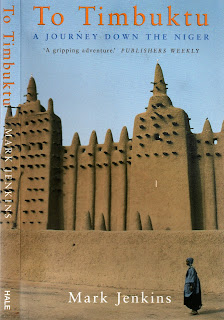Robert Hale paperback edition - 2002
I found this book disappointing and I am still trying to work out why. Perhaps it is because it is not long since I read Frank Kryza's 'The Race for Timbuktu' (see my BLOG for 22nd July), with its story of (often senseless) bravery and death. Those explorers were real men! Mark Jenkins does, in fact, intersperse the account of his own journey with short sections on John Ledyard, Major Daniel Houghton, Mungo Park , Major John Peddie, Major Dixon Denham, Hugh Clapperton and Major Alexander Gordon Laing. It felt a little like a 'scissors and paste' job, though.
I wonder if the title of James' book changed. Was it originally 'A Journey Down The Niger' with Timbuktu as a subtitle? When I studied the very poor map on page 12, I realised just what a minute length of the river Mark and his best mate Mike Moe travelled down. Okay, they did find one of the, probably many, 'sources' at Tembakounda, hacking through some pretty awful jungle landscape; but they called a halt at Siguiri, just 250 miles or so from the source - not very much of a 2,600 mile long river. I had more respect - and liking? - for the other two on the expedition, John Haines and Rick Smith, who appeared much more level-headed and at least made it to the Niger delta in the Gulf of Guinea. Both Mike and Mark left their wives pregnant back in Wyoming and only once the Niger got wider, more crowded and 'boring', did Mike decide he ought to go home. Mark, however, by hitching lifts and purchasing a motor-bike, managed to get to Timbuktu.
Mark describes the 'grand undertakings' (their long trips abroad) as like falling in love...you're obsessed. Unless the reader has that empathy, the story of their travels becomes more a tale of selfishness. The first of several photographs in the middle of the book is of the bearded Mike Moe - exactly how I imagined him. At the end of the book is a section entitled Coda. It charts not only the birth of Mike and Mark's firstborns, their trip to Tibet (when their wives were again pregnant), but a trip made by Mike, his younger brother Dan and two others, to Baffin Island in August 1995. A whale breached beneath their small motorboat, capsizing it. One by one they succumbed to the near freezing ocean. Only their Inuit Eskimo guide, wearing an insulated survival suit, survived. Strangely, it didn't seem very sad or a tragedy to me. Brave, yes; foolhardy, yes. There is an air of inevitability about people like Mike Moe, dying aged only thirty-seven.
The book is not particularly well-written. It mixes dialogue - repartee usually - the veracity of which is often suspect, with descriptions of the jungle and the river (the river is two-faced, two-hearted for the next three days. Stretches of pious brown water; then you round the bend.) They meet up with a fascinating Guinea African, Sori Keita, who almost forces himself on them as a guide. The author not only inserts information about the 19th century European explorers, but also pieces about an earlier trip he took with Mike to Morocco and the North African Mediterranean coast. This only serves to confuse the reader and is not particularly interesting.
I did like the perception of one man the author bumped into at Kouroussa. A man with a red face and thinning blond hair, he is with some arm of the United Nations. A German who has lost his accent. Worked all over the world. Thailand, Chad, Burkina Faso. Economic development projects. Silkworms, hybrid rice, farming techniques. Thirty years of it. 'But this is the worst...Africa's fucked. It fucked itself... Asia is better. People work in Asia. Africans...Africans! All they do is fuck off.' Nearly thirty years later, it still hits the nail on the head.
I read To Timbuktu because it was in the cheap remainder section of the Cinema Bookshop in Hay-on-Wye, and as a modern follow-up to the story of the explorers of the nineteenth-century. I took note of the fact that the author wrote/writes for GQ and the Reader's Digest. Enough said.

No comments:
Post a Comment